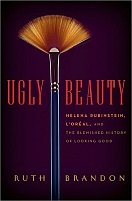|
|
BOOK
ILLUMINATIONS
From Merrimon Book Reviews
|
|
Ugly Beauty:
Helena Rubenstein, L'Oreal, and The Blemished
History of Looking Good

by Ruth Brandon

Fascinating
In UGLY BEAUTY, Ruth Brandon explores the beginnings of the
cosmetics industry by first contrasting the lives of Helena Rubenstein
and Eugene Schueller, the founder of L'Oreal. Rubenstein, a
Polish Jew, found freedom and independence through her work.
Brandon uses Rubenstein's life to exemplify the changes in women's
roles as working women found new roles in society. Schueller, a
conservative who believed women should stay at home, used his business
to climb up the political and economic ladder. From the contrast
of the these two cosmetics leaders, Brandon moves on towards a closer
examination of the Nazi connections of Schueller from the scandals that
came to light as L'Oreal sought to take over Rubenstein's
company. Brandon examines and contrasts the older Rubenstein and
Liliane Bettencourt, Schueller's daughter and the life models of
women's role as held by Rubenstein and Schueller on both women in their
later years. Once again another scandal emerges concerning
Schueller's family.
UGLY BEAUTY is part history, part feminist social analysis. As a
work of history or cultural critique, the connections between the
sections are more intuitive than spelled out with facts and
analysis. UGLY BEAUTY is not a complete history of the beginnings
of the cosmetics industry but rather a work that focuses on two
individuals whose businesses later became connected as models of the
different roles of women and business. As a scholarly work, UGLY
BEAUTY would needs more to make the connections between the history of
the individuals and some of the fascinating questions the author poses
towards the end of the book. The small reference to
photography/photoshopping poses intriguing questions of beauty
standards, a topic which could have been another chapter in and of
itself. The same holds for as the questions about business
conglomerates and their role in politics. The focus and force of
the book centers on Schueller. More attention to the life of
Rubenstein, particularly since the author often places her as the more
powerful role model, would have made this book more powerful both as a
scholarly work and for the more casual reader. More attention to
Schueller does, however, allow the author to examine more of the
subtleties of his Nazi connections which seem all the more important
because of the less direct perfectly definable way power and financial
power were and are amassed.
As a scholarly work, UGLY BEAUTY needs much more, although what it
needs is exactly the kind of writing that makes a reader not chose the
book to explore over a weekend or as an introduction into a new
topic. One need not know the cosmetics industry to enjoy this
book. One does not even need to wear make-up at all to find this
book quite compelling in its mix of history and social critique.
As a more casual relaxed but still intellectually provocative read,
UGLY BEAUTY fascinates. I simply could not put it down and read it
cover to cover with only necessary interruptions. The examination
of the beginnings of the cosmetics industry presents a fascinating look
into a topic not often discussed in WWII history and historical fiction
while the modern section hints at the importance of history as part of
the underpinnings of today's world. As feminist analysis, a topic
this reader enjoys as well, the analysis was just too weak or
unscholarly to excite me perhaps because of my extensive reading in
academic feminist literary theory. UGLY BEAUTY would probably be
of more interest for those whose interest in feminism is less
academic. The author posits several side questions which lead a
reader to ask more in depth questions. As such, UGLY BEAUTY might
make a good choice for book clubs. The more intuitive leaps and
the author's ability to leave some questions unanswered certainly
sparked my intellectual interest.
Despite my criticisms of this book, I highly recommend UGLY BEAUTY as a
great choice for the reader who wants to explore something totally new
or who might have interest in one part (business or history or
feminism) and want to explore another shade of that topic. UGLY
BEAUTY does not bog a reader down with extensive footnotes (Notes and
Bibliography at the end) or compel a reader to read with pen or pencil
to underline -- which can be a blessing if a reader really just wants
to explore a topic rather than read a huge definitive tome.
UGLY BEAUTY is a book to enjoy --- and enjoy it I did! I read the
book from cover to cover unable to tear myself away from it. It
has been a long time since a book pulled me so much that I stopped
everything until I read the last page.
Publisher: Harper
(February 1, 2011)
Reviewed by Merrimon,
Merrimon Book Reviews

|
|
|